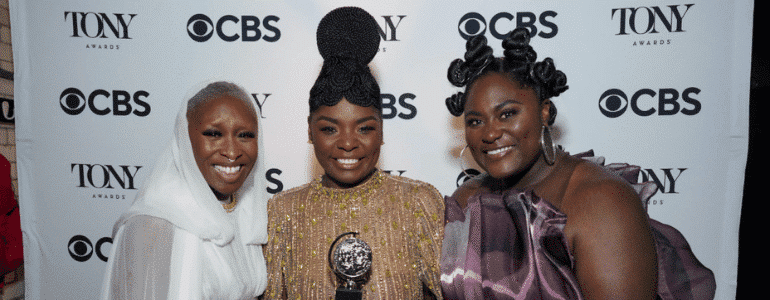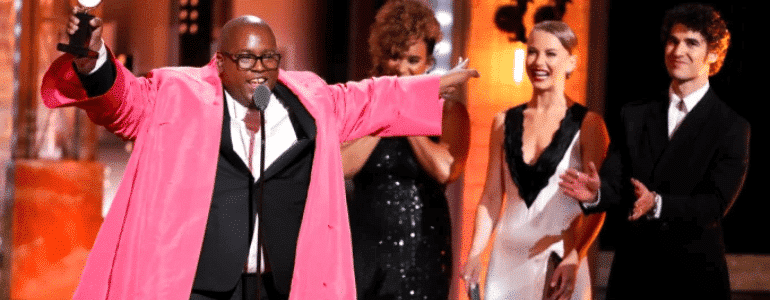What does Tony Kushner think about the Off Broadway musical?
I don’t know about you, but I think this Tony Kushner guy has a future. The dude can write.
Case in point . . .
Remember that giveaway that I announced yesterday for Encores! Off-Center? Well, Mr. Kushner wrote a little essay for the City Center Playbill on the subject of the Off Broadway musical, extolling its virtues and declaring it essential for the American Theater. And it’s pretty awesome.
My only qualm is that no one heard him speak it. (If you ever have a chance to hear Mr. Kushner deliver one of his infamous ‘talks’, drop everything you are doing and get as close to that stage as possible – he’s a force of public speaking nature.)
I’ve posted the article below. If you like it, do me a favor, go see an Off Broadway show and encourage your friends who ask you what show they should see to do the same. Off Broadway is the beginning for so much great theater. And we don’t want it to end.
Enjoy the article, and thank you Mr. K.
The history of the American musical — wait, wait, don’t turn the page yet, I know, I know, how unappealing, it’s like starting with “The semiotics of sex” or “The ontogeny of napping” or “Webster’s defines chocolate as…” Nevertheless: The history of the American musical is inseparable from the history of Broadway, where the form was formed out of the history of European opera and operetta, where it was made native and nurtured and matured, thence to spread worldwide, inspiring theatre cultures in other countries to attempt to write their own musicals, which attempt, so far as I’m aware, and I’m no musical theatre expert but I think I have good taste, with the exception of a few great Noël Coward songs and Oliver!, has been a complete failure, proving something about America, though I’m not sure what.
I guess it proves that Americans write the best musicals. Why? I have no idea; I love musicals (when they’re good) but I know relatively little about them. I know that so many musicals, old and new, are about success that it seems to be the case that success is what musicals mean; if that’s true, perhaps that’s why Americans write such good musicals, because we have a special relationship with success. And if it’s true, then all musicals must succeed, because who wants to listen to a loser telling you how to succeed.
I love musicals enough to occasionally read books about them. Stephen Sondheim’s “Finishing the Hat” is among the very best I’ve read about musical theatre and any other kind of theatre. I think it’s indispensable. Sondheim begins by describing the American musical emerging from an awkward adolescence as a kind of elaborate varsity show (with magnificent songs by Gershwin, Kern, Porter, Arlen et al) into adulthood.
Thanks in large part to the efforts of Richard Rodgers and Sondheim’s mentor, Oscar Hammerstein II, it became possible for the musical — for the whole megillah, not just its splendid individual songs — to dream without embarrassment of seriousness of purpose and aesthetic ambition, perfecting what’s come before (AKA “Finishing The Hat”) and breaking through perfection into undiscovered terrain (AKA “Look, I Made A Hat”; AKA Volume II). Sondheim writes that, once the path had been opened and the new world discovered, the next generation — Kander and Ebb, Coleman and Leigh, Sondheim and Sondheim — plunged in and explored. “We went at it,” he writes, “with a will.”
Despite the revolution, some things haven’t changed. That all musicals are born dreaming of an apotheosis on the stage of a commercial theatre in the Times Square area is still a common assumption, dying by slow degrees but alive enough to be worrisome to the kind of people who worry about musicals — about the musical theatrical form, as opposed to the musical theatrical dividends. Musicals are very expensive to produce, and someone has to pay for them, and get paid back, and there’s nothing wrong with dividends. Well actually there’s plenty wrong with dividends, but that’s another story.
Or actually what’s wrong with dividends is sort of the story of The Cradle Will Rock, and in a way it’s part of the story of the musical, at least of musicals like Cradle and I’m Getting My Act Together and Taking It on the Road and Violet, the varied subjects and varied production histories of which cohere in their rocky relationships with the marketplace.
Success is fine; I like to succeed as much as anyone and I even like watching others succeed, at least on my better days I do. Success that’s honorably as opposed to cynically achieved can be an honorable entertainment. But there’s more to life than success, alas. Musicals can also do what Auden praised Yeats for having done: they can “sing of human unsuccess/ in a rapture of distress.” We’re immortal birds not born for death, each and every one of us; our souls, the deepest truest human impulses, ideas and actions, truly and fully expressed, must pour forth abroad in ecstasy. Or words to that effect. Know what I mean? And that’s why there are musicals.
(Got a comment? I love ‘em, so comment below! Email Subscribers, click here then scroll down to say what’s on your mind!)
_ _
FUN STUFF:
– Win two tickets to see I’m Getting My Act Together . . . Click here to enter.
– Like the blog? Like me on Facebook. Thanks in advance.
Podcasting
Ken created one of the first Broadway podcasts, recording over 250 episodes over 7 years. It features interviews with A-listers in the theater about how they “made it”, including 2 Pulitzer Prize Winners, 7 Academy Award Winners and 76 Tony Award winners. Notable guests include Pasek & Paul, Kenny Leon, Lynn Ahrens and more.















